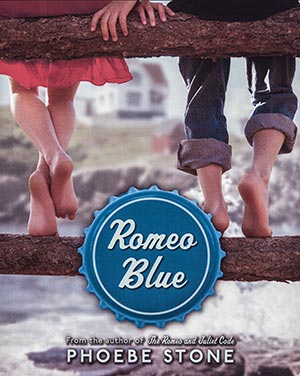|
Praise for Romeo Blue
A NEW novel by Phoebe Stone — Published June 2013
 Starred Review Hornbook Starred Review Hornbook
August 21, 2013:
Romeo Blue is the best sort of sequel: one you didn’t know you wanted but are ever so grateful to have. Its predecessor, The Romeo and Juliet Code (rev. 3/11), ended with British ex-pat Flissy content in sleepy Bottlebay, Maine, with the Bathburns — matriarch The Gram; flighty and sweet Aunt Miami; hunky young Derek; and Uncle Gideon, whom she learned is her father. It’s now 1942, the Coast Guard is patrolling for U-boats, and there’s still no word from Winnie (her mother) or Danny (the man she thought was her dad), who are Allied spies stationed in France. Life goes on for Flissy and co., even in the midst of such uncertainty. Her love for Derek unabated, Flissy is stung when he takes someone else to a dance. A welcome visitor is her young friend Dimples, an evacuee from England whose guilelessness is a breath of fresh air for the secret-harboring Bathburns. Another surprise arrival (no spoilers here, but it’s a good one!) upends Flissy’s expectations in ways that are breathtakingly complex. Stone manages the cunning feat of writing in a style both lyrical and propulsive, with short chapters impelling readers ever onward as the multifaceted story unfolds. The end of the book brings some closure, although, just as with The Romeo and Juliet Code, not everything wraps up tidily. Some characters remain absent, and some are irrevocably changed, a reminder of the devastation wrought by war.—Elissa Gershowitz
 Starred Review Booklist Starred Review Booklist
May 1, 2013:
This absorbing follow-up to the The Romeo and Juliet Code (2011) picks up with the Bathburns in Bottlebay, Maine, one year later and with WWII in full swing. Flissy hasn’t heard a word from her parents, who are spies missing in Europe, but keeps herself occupied with her love interest, Derek, the boy the Bathburns unofficially adopted. When a man shows up claiming to be Derek’s long-lost father, Flissy struggles to keep her suspicions about him to herself. Soon, Mr. Henley, the local postman and poet, is called for duty in North Africa; Aunt Miami joins a USO traveling production of Romeo and Juliet; and Gideon, Flissy’s biological father, undertakes a secret mission. Intrigue and mysteries abound: Who is “The Moth Man”? What is Gideon doing in France? Will everyone come home alive? Our 13-year-old narrator captures the effect of the upheaval on her life and her family as she transitions, perhaps prematurely owing to her circumstances, from child to adult.
Stone’s evocative writing sets time and place beautifully, with descriptions of blackout curtains and the war effort—not to mention the stormy coast of Maine—and her passages about war feel relevant today (“Here in such a lush and green world, why do people hurt and kill one another and why is there such a thing as war?”) Compelling, and with plenty of heart and soul. —Ann Kelley
Young Adult Novel set in Maine will delight readers of all ages
Portland, Maine Press Herald -- Sunday October 22, 2013
By Lloyd Ferriss
Set on the Maine homefront during World War II, this novel is delightful. Author Phoebe Stone wrote it for teenage readers. But this 72-year-old reviewer found it enchanting. You will too.
Romeo Blue is the sequel to Stone’s hugely praised “The Romeo and Juliet Code,” a book the Boston Globe called “...quite simply the best novel for young readers... since ‘Harry Potter and the Sorcerer’s Stone.’”
But you don’t have to read the first to appreciate the second.
Romeo Blue begins with 12-year-old Flissy Bathburn’s first weeks at her American grandmother’s old house overlooking the ocean in fictitious Bottlebay, Maine. Flissy was born in London, and her mother sent her to the Maine family homestead to escape danger posed by German bombs that rain down on London practically daily.
But there’s another urgent reason for Flissy’s relocation. Her parents, who speak fluent German, are spies for the Allies with plans to infiltrate the German military. Back in Bottlebay, Flissy’s beloved Uncle Gideon is part of their spy ring and plans to join them overseas.
Though Flissy (her full name is Felicity B. Bathburn) dislikes the drafty, wind-blasted Maine house, she’s a happy, high-spirited girl at heart. Soon she’s in love with orphaned Derek, a moody 13-year-old taken into the Bathburn household by Gideon.
Flissy, narrator of Romeo Blue, reveals her feelings about Derek early in the book.
“He seemed a bit moody today,” she says, “but I rather liked moody. It could be quite dashing when hovering over someone like Derek. I would have followed Derek to the edge of the world, if he had wanted me to. And then perhaps we would have had to hold hands because it must be quite windy at the edge of the world.”
As an author, Stone does a marvelous job recreating the wartime years of the 1940s. Haunting songs of the era, clichès used during the war and patriotism evoke the atmosphere. Children and adults darn socks for soldiers overseas. Food is rationed. There are blackouts. Families gather around the radio evenings to hear cryptic broadcasts about the war in Europe.
The Bathburn house itself, the stern face of its 19th century founder looking down from a painting on the wall, seems to express the lean the war years, as does the brooding ocean.
As Stone’s narrator, Flissy is sensitive to it all.
“The water,” she observes, “was all foamy and white and full of worry and wonderment, the waves slapping back and forth in the autumn air. The big, dark rocks along the shore looked almost like large animals crouching...”
Early in the novel, Flissy grows upset by Derek’s secret search for his birth father. When reclusive Mr. Fitzwilliam offers to help, she worries about the strange man. Could he be a Nazi spy trying to get information about her mother and father overseas?
Flissy begs Derek to tell Uncle Gideon and “The Gram” what he’s up to. But he swears her to secrecy and — feeling about Derek as she does — she’s tormented by conflict.
And Flissy has her own family conflict. Is her birth father the man with her mother in Europe? Or Uncle Gideon?
Characters in oceanside Bottlebay are well drawn. There’s Mr. Henley, the postman who writes poems that magazines reject. He’s drafted and sent to North Africa, where he writes a series of poems about war. Published in the U.S., his book is a smashing hit.
Since its own publication in June, Romeo Blue has garnered wide-ranging praise. According to Booklist, “Stone’s evocative writing sets time and place beautifully... and her passages about war feel relevant today.”
Author of at least nine other well-received novels, Stone lives in Middlebury, Vt. She was a recognized painter before turning to children’s literature, her brightly colored work appearing in New England and New York galleries.
“Romeo Blue” is suspenseful to the end. It doesn’t sugarcoat war. It has wonderful characters. Stone’s writing shines with great metaphors and similes. Buy this book for your literary teenager. Then you read it.
Lloyd Ferriss is a writer and photographer who lives in Richmond.
Top of page
|


